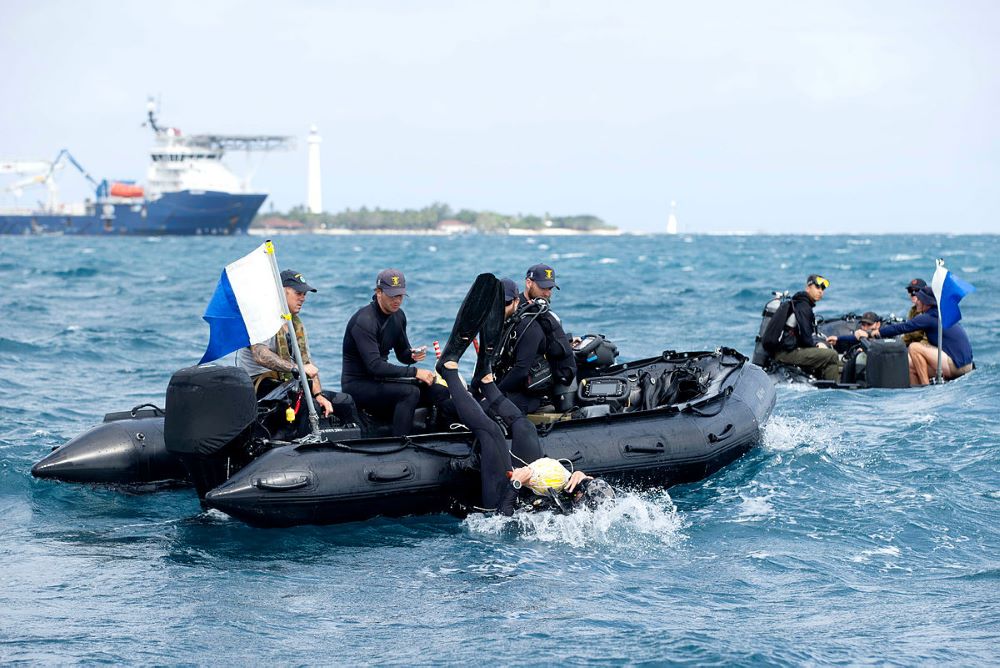Australia, France and finding equilibrium in Southeast Asia

Australia and France have made significant strides towards repairing their diplomatic relationship in the nearly two years since Australia’s cancellation of its submarine contract with French company Naval Group. Technically, they are close neighbours, sharing a long maritime border in the Pacific. While French President Emmanuel Macron didn’t drop by Canberra during his ‘historic’ Pacific tour last month, his visit reinforced that a committed and energised France can complement Australia’s efforts in the region.
In addition to announcing new environmental initiatives, including to protect rainforests, Macron made a powerful statement denouncing malign Chinese influence in the Indo-Pacific, describing a ‘new imperialism appearing, and a power logic that is threatening the sovereignty of several states—the smallest, often the most fragile’.
Franco-Australian cooperation has bilateral benefits, but just as importantly enhances both countries’ roles as development and security partners for the whole Indo-Pacific. Individually, each state has much to contribute to the region: Australia as an active middle power and France with its significant naval strength. If both Canberra and Paris want to strengthen the regional order and mitigate the effects of strategic competition, they should find ways to jointly cooperate with Southeast Asia—the self-declared epicentre of the Indo-Pacific.
Southeast Asian states are looking for reliable partners amid intensifying US–China strategic competition. According to the 2023 State of Southeast Asia survey, the region’s most trusted partner for hedging against the uncertainties of this strategic rivalry is the EU, though there’s scepticism about its capacity and political will for global leadership. With Macron’s vision for his country as a puissance d’équilibre that keeps regional powers in balance and a clear Indo-Pacific strategy, France has shown that it’s willing to do more in the region. As a ‘resident nation’ (une nation residente) in the Indo-Pacific, France’s Minister of the Armed Forces Sébastien Lecornu has declared to the region that ‘your stakes are our stakes’ (vos enjeux sont les nôtres).
For its part, Australia is one of only four countries with a comprehensive strategic partnership with ASEAN. Canberra’s ‘strategic equilibrium’ narrative aligns well with France’s stance. Deepening ties with Southeast Asia and working to help it achieve its development priorities with partners such as France would give credence to Australia’s words on ASEAN centrality. For Southeast Asian countries that are hesitant to explicitly take a side in US–China competition, further cooperation could build Australia’s credibility as an Indo-Pacific partner.
However, Southeast Asia is a crowded and contested space, and Australia and France have so far identified few reasons for close bilateral coordination there. That’s despite the fact that they have a significant Southeast Asian presence already, both diplomatically (Australia has 16 posts in the region and France 11) and as development partners (Australia has committed $1.2 billion in aid to the region in 2023–24 and France contributed $1.3 billion in 2020).
The key is for Canberra and Paris to play to their strengths. Maritime security is of enduring interest to Southeast Asia and the wider Indo-Pacific, particularly where trade routes are concerned. Australia and France could build on joint transits in the South China Sea, the last of which occurred in 2021, and on their mutual interest in maritime domain awareness and supporting Southeast Asian efforts to counter illegal fishing.
Southeast Asia’s leaders often call for strengthening of ASEAN centrality and thus ASEAN-centric architecture. The ASEAN Defence Ministers’ Meeting and its working groups is an ideal place to do this, given that France is an ADMM observer and Australia is a member of ADMM-Plus.
Another critical area is climate change. In July, Australia committed $50 million to support Indonesia’s green-energy transition and Western Australia pledged to take further steps to support Jakarta’s nascent electric vehicle industry. At the January 2023 France–Australia ministerial consultations, the two countries articulated other ASEAN priorities on which they could work more closely, such as connectivity and economic cooperation.
Aside from Southeast Asia-wide cooperation, deepening trilateral engagement between Indonesia, Australia and France would have benefits. As the only Indo-Pacific states with territory in both the Indian and Pacific Oceans, the three countries have a special stake in the region. In France’s case, a ‘powerful strategic intimacy’ is emerging between Jakarta and Paris based mainly on Indonesian defence acquisitions from French manufacturers. Paris’s burgeoning defence relationship with Jakarta was demonstrated most recently with a deal to supply fighter jets and submarines to the Indonesian military.
At the recent Australia–Indonesia leaders’ meeting in Sydney, Australian Prime Minister Anthony Albanese endorsed plans to upgrade bilateral defence ties to the treaty level. Greater maritime capacity in the Indonesian navy, supported by French capability and Australian training, would allow Jakarta to do more with its partners. There’s also value in exchanging views trilaterally on maritime security, humanitarian assistance and disaster relief (particularly how the FRANZ Arrangement between France, Australia and New Zealand could engage Indonesia), and environmentally resilient infrastructure.
This would not necessarily need to start at, or grow to, the official or ministerial level to be useful. A Track 1.5 or Track 2 dialogue is a more feasible and less complicated starting point for the grouping. In proposing such as dialogue, Australia must be aware of how it would fit within the already crowded minilateral space in the region and Indonesia’s appetite for engaging with it. But it could give Australia an opportunity to address Indonesian concerns about its strategic outlook since the announcement of AUKUS in the context of a security dialogue with France, which is perceived as being more independent of the US alliance system.
Of course, Australia and France have other commitments to the Indo-Pacific and in other parts of the world. Still, when it comes to supporting Southeast Asia, two heads working together are better than one.